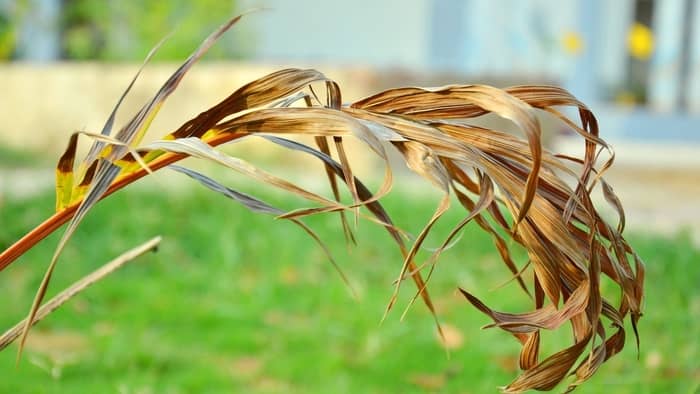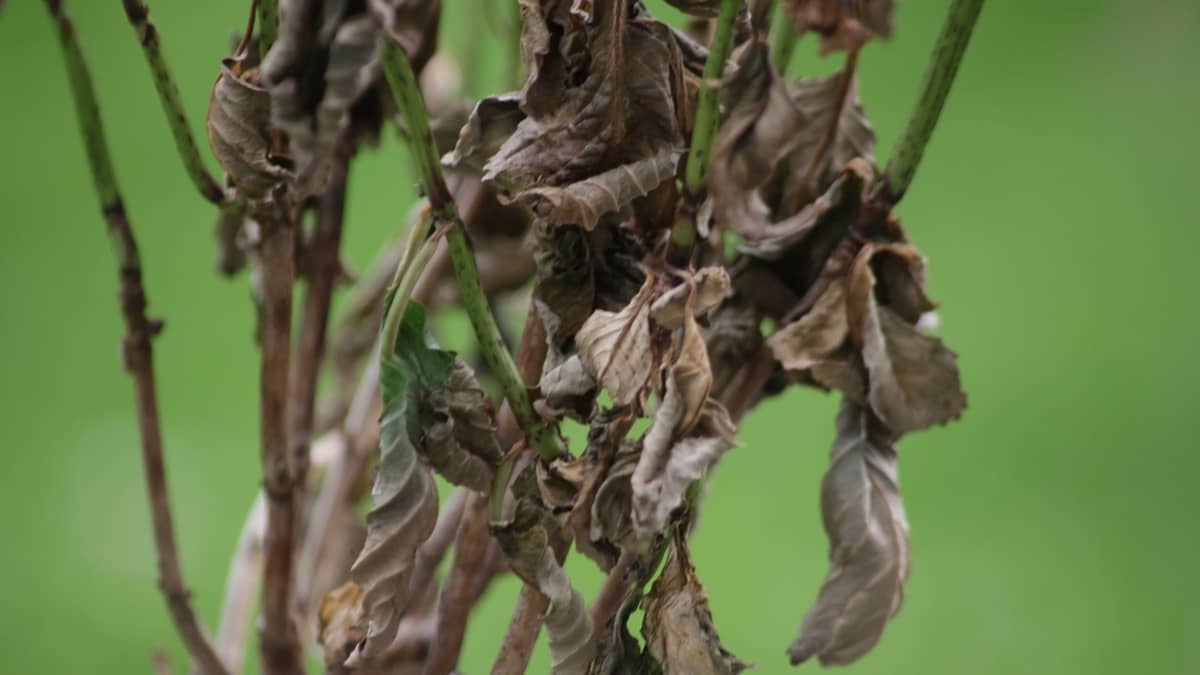Last Updated on August 29, 2022 by Griselda M.
Ammonia is a very important source of available nitrogen in the environment. In all things in life moderation is important, and yes, too much ammonia is a bad thing. So, does ammonia kill plants? Yes – if you add too much. To understand this we need to go into this in a bit more detail.
A Quick Overview Of Ammonia and Why It is So Important
Nitrogen makes up about 78% of the atmosphere. This Nitrogen is in the form of Nitrogen gas, N2, and it is really stable! We are comprised of about 3-4% Nitrogen (depending on how fat you are). This Nitrogen component in our body is mainly concentrated in proteins and nucleic acids (DNA and RNA). So this is a very neat way of saying that if we did not have Nitrogen, we would not exist.
The natural process whereby Nitrogen is taken from the atmosphere and converted into Ammonia is typically mediated by bacteria. The process of converting Nitrogen gas into Ammonia is very energy-intensive, chemically complex, and slow. Bacteria in the soil are one group of Nitrogen fixing bacteria.
There are also symbiotic bacteria that grow in the roots of legumes that can fix Nitrogen – the legumes give the bacteria abundant energy in the form of sugars, and the bacteria then synthesize ammonia that the legumes can use to produce proteins. This is why legumes are such an excellent protein source, and why growing legumes in your garden are so important.
There are also blue-green algae that can produce Ammonia. These algae have the advantage of being able to produce their own energy, via photosynthesis, and then they have special cells that they send this energy to for use in Nitrogen fixation. These cells can fix Nitrogen, and this ammonia is then shared with the photosynthetic cells.
Haber and Bosch and how they changed the world
Most people have never heard of these two geniuses – but they invented the Haber Bosh process that produced ammonia on an industrial scale in reactors. These reactions are typically driven by fossil fuels at the moment, and some estimates place the percentage of humanity that exists on Earth because of the Haber Bosch process at close to 50%. Without the process they invented, much of the modern world would not exist and we would probably all be starving.
How is Ammonia processed into fertilizer?
Ammonia is quite toxic, hence in nature, it is absorbed and used quickly by plants. For instance, in the roots of legumes, if the plants do not quickly move the ammonia being produced in root nodules, it can build up to levels that are toxic to the plant. Ammonia also tends to evaporate – which is not ideal.
So normally, we try to convert ammonia to ammonium and react it with something. Hence common salts used in fertilizers tend to be Ammonium nitrate or Ammonium Sulphate, Monoammonium phosphate, or Diammonium phosphate. Urea and urea derivatives are also common.
Mr. Fulvic Organic Fulvic Acid Plant Amendment
Does Ammonia Kill Plants?
Ammonia and ammonium fertilizers can kill your plants if you add too much. This is a common mistake that beginner gardeners make. You want to be a superhero and produce the most amazing plants.
You buy fertilizer and follow the dosing instructions and boom – big healthy plants. Then you get a bit ahead of yourself, think hmm, let’s mix this nice and strong, and then your plant turns bright yellow, drops its leaves, and dies. You go from hero to zero quickly.
So if you are adding synthetic, or natural fertilizers rich in Nitrogen compounds be careful – I tend to always rather under-dose Nitrogen to my plants than add too much. Get your soil healthy, and have a lot of mulch and with time the natural soil Nitrogen cycle (driven by bacteria using the energy in the mulch) becomes quite efficient. I grow Fava beans in winter, as well as peas, and beans in summer.
These legumes produce a lot of biomass, which can then be put in the soil as mulch, releasing Nitrogen fertilizer naturally into the soil. You will never burn a plant this way.

Ammonia Fertilizer
As mentioned earlier, ammonia is quite unstable and will evaporate, hence for fertilizer formulations, we tend to use salts of ammonia. Even these do actually break down to release ammonia, which is a pollutant that is quite bad. As an example, in the European Union, there is considerable worry about this.
In the soil, there is a process by which ammonia is converted back to Nitrogen gas. This is the work of denitrifying bacteria generally, and this process helps to maintain a balance in your soil. If you do happen to add too much ammonia/ammonium and damage your plants, rest assured the natural cycles will eventually heal your soil. Next time around use a slow-release organic nitrogenous fertilizer and you will be much safer!
I am increasingly a fan of these fertilizers composed of chicken feathers – chicken feathers are generally a huge nuisance as a by-product of poultry farming. Now, clever entrepreneurs take this waste, hammer mill it into a fine powder, and mix it with other nutrients to create prill formulations that can be added to your garden or lawn. Some of these will release nitrogen for a few years, and really make your garden healthy.
Nitrogen in the form of ammonia, nitrite, and nitrate is utilized by plants for growth, reproduction, and defense against pathogens. The amount of nitrogen in the soil that is available to plants is dependent on the rate of its release from the soil to the plant roots and the rate at which it is taken up by the plant. The amount of nitrogen available to the plant depends on the quantity of nitrogen in the soil, the availability of nitrogen for uptake by the plant, and the ability of the plant to utilize the nitrogen. It is a balance and with time we learn more and more about how to create this balance.
In Conclusion – Does Ammonia Kill Plants?
To answer your question “Does ammonia kill plants?”, a lack of Nitrogen in the soil, or too much Nitrogen in the soil will kill your plants! So yes, get the balance right, and you will have green lovely productive plants. Get it wrong and you have yellow sickly/dead plants.
Read more about Does Aloe Vera Attract Bugs?
Frequently Asked Questions
Can you spray ammonia on plants?
In small concentrations you can - but it will evaporate and blow away in the wind. Rather use an ammonium salt, such as Monoammonium phosphate for foliar feeding - in very low concentrations.
How much ammonia is toxic to plants?
This varies from plant to plant. As an example tomatoes and peppers can tolerate high levels of ammonia, but some of my indigenous flowers will die if they get a tenth of what I put on the tomatoes. My general advice - stay away from chemical formulations containing ammonium salts and rather use slow release organic formulations.
Do plants like ammonia?
Generally yes. In low concentrations. They prefer ammonium salts, as these are more stable and somewhat less toxic. Sniff a bottle of ammonia - it will feel like you got punched in the face. Imagine your poor plant if it had feelings. If you sniff a bag of ammonium sulphate you will be a lot less nose damaged.
How does ammonia affect plant growth?
In low concentrations it provides a source of fixed Nitrogen that the plants will use for protein synthesis and growth. Your plants will get green and look quite healthy. In high concentrations, your plants will turn yellow and possibly die.
Caroline is a gardener who loves to get down to the nitty–gritty of gardening. She proudly proclaims herself as a ‘dirt worshipper‘ and can often be found deep in the garden, covered in soil and singing to her plants. As a self–proclaimed ‘plant whisperer‘, Caroline believes that plants need love and attention just like any other living thing, and she loves to give them both. When she‘s not tending to her garden, you can often find her researching the latest gardening trends, or teaching others how to make their gardens thrive



